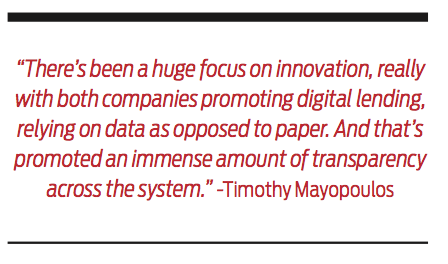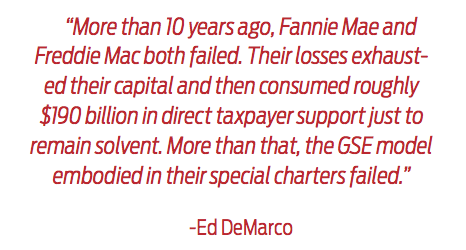More than a decade ago, the U.S. economy saw its greatest fall since the Great Depression – and it came at the hands of the housing industry.
Its consequences were sweeping. Families lost their homes, parents lost their jobs and America lost its trust in the banking system.
In an attempt to soften the fall, former President George W. Bush signed an order to bail out mortgage giants Fannie Mae and Freddie Mac, creating the phrase “too big to fail.”
Originally, the U.S. Department of the Treasury bailed out Freddie Mac for $71.3 billion and Fannie Mae for $116.1 billion.
Since then, the government-sponsored enterprises have more than paid back their debts to American taxpayers. As of the fourth quarter of 2018, Freddie Mac has paid $116.5 billion back to the Treasury, and Fannie Mae paid made payments totaling $175.8 billion.
Now, as the housing market continues to improve, many have called on the government to release the GSEs from conservatorship.
“More than 10 years ago, Fannie Mae and Freddie Mac both failed,” former head of the Federal Housing Finance Agency Ed DeMarco said in an interview with HousingWire. “Their losses exhausted their capital and then consumed roughly $190 billion in direct taxpayer support just to remain solvent. More than that, the GSE model embodied in their special charters failed.”
“Yet only Congress can change those charters,” DeMarco, who is now president of the Housing Policy Council, said. “Thus, it remains necessary for Congress to act. And it is urgent that Congress acts because further delay maintains the uncertainty and market distortions posed by the conservatorships and permits the systemic and taxpayer risk embedded in these two companies to continue growing.”
And it appears the administration might be listening.
Trump calls for reform
In March, President Donald Trump began officially calling for an end to the conservatorship of Fannie Mae and Freddie Mac.
A statement released by the White House said that Fannie Mae and Freddie Mac have grown in size and reach, yet face no competition from the private sector, and that the U.S. Department of Housing and Urban Development programs are exposed to too much risk while relying on outdated processes.
In the announcement, Trump called for reform that “promote[s] competition in the housing finance market and create[s] a system that encourages sustainable homeownership and protects taxpayers against bailouts.”
In a memorandum, Trump tasked HUD and the U.S. Department of the Treasury with drafting proposals for reform, with the Treasury detailing Fannie and Freddie plans while HUD lays out a plan for the housing finance agencies it oversees.
Specifically, Trump’s order will direct the “relevant agencies to develop a reform plan for the housing finance system.” The reforms will “aim to end the  conservatorship of Fannie Mae and Freddie Mac and improve regulatory oversight over them.”
conservatorship of Fannie Mae and Freddie Mac and improve regulatory oversight over them.”
The White House also stressed that the administration will work with Congress to create a comprehensive plan for housing finance reform.
Absent concrete details for change, most groups in the housing space applauded the president’s move as an official step forward to instigating long-awaited change.
And, thus far, it appears they’re all ready to work together to make it happen.
Treasury Secretary Steven Mnuchin was among the first to respond.
“I look forward to working with FHFA, HUD, Congress and other stakeholders to address the need for housing finance reform as laid out by President Trump’s Presidential Memorandum,” Mnuchin said. “We support a system that provides for access to lending for hardworking Americans, while also protecting taxpayers from risk. An effective and efficient federal housing finance system will also meaningfully contribute to economic growth.”
 Other members of the housing industry weighed in, full of hope, and willing to work with the administration on any needed reform. They quickly offered their insights, advice and willingness to help to the administration.
Other members of the housing industry weighed in, full of hope, and willing to work with the administration on any needed reform. They quickly offered their insights, advice and willingness to help to the administration.
It’s not “GSE reform”
But reform of the government-sponsored enterprises already happened.
Or so says former Fannie Mae CEO Timothy Mayopoulos.
Mayopoulos served at the mortgage giant for more than 10 years before moving on to become the president at Blend, leading its go-to market and corporate support functions and serving on the board of directors.
In an interview with HousingWire, Mayopoulos explained that over the past 10 years, the GSEs had already seen reform. And indeed they did – opening access to credit, serving the underserved markets and much more. Now what is needed, Mayopoulos argued, is housing finance reform.
“Reform of the government-sponsored enterprises has already happened,” he said. “What people are really talking about is housing finance system reform. It is often frustrating to me that policy makers often don’t acknowledge that Fannie Mae and Freddie Mac are fundamentally different organizations today than  they were 10 years ago, before the crisis.”
they were 10 years ago, before the crisis.”
He explained that over the past 10 years, mortgage lenders have been very well served through changes from Fannie Mae and Freddie Mac.
Some of the accomplishments from the GSEs over the last 10 years include:
- Expanding access to credit
- Lowering systematic risk
- Standardizing pricing
- Distributing credit risk to provide capital
“There’s been a huge focus on innovation, really with both companies promoting digital lending, relying on data as opposed to paper,” Mayopoulos said. “And that’s promoted an immense amount of transparency across the system.”
He reminded us that GSE reform has already taken place – what’s needed now is housing finance reform.
“There’s been enormous GSE reform over the last 10 years,” he said. “What we’re really talking about is: Is there going to be housing finance system reform, either led by the administration or led by Congress.”
A new reality
While everyone is calling for reform, there are different ideas about what that should look like. But one thing is clear – it should not look the same as it did back in 2008.
The market has changed. Fannie Mae and Freddie Mac have evolved, and whatever reform bill is decided on, it must acknowledge this new reality.
There are several changes, made during the GSEs’ conservatorship, that some experts believe should be kept in place.
DeMarco made the case that the following systems should be kept intact even amidst reform:
- The efficient forward market that allows borrowers to lock in rates before settlement, known as the To-Be-Announced market
- The standardization of data and reporting
- Transparent and consistent reps and warrants
- Attracting private capital from mortgage insurers and a range of other capital providers
- The ongoing, nationwide access to the secondary mortgage market by lenders of all sizes and types
Mayopoulos agreed, saying some changes just can’t be reversed.
 “There’s been a remarkable amount of consensus around many things that would have been controversial 10 years ago,” Mayopoulos said. “For example, most people have come to accept the idea that the government will play a substantial role in the housing finance system. Perhaps not as big of a role as it plays today, but nonetheless, we’re not going to completely privatize the housing finance system.”
“There’s been a remarkable amount of consensus around many things that would have been controversial 10 years ago,” Mayopoulos said. “For example, most people have come to accept the idea that the government will play a substantial role in the housing finance system. Perhaps not as big of a role as it plays today, but nonetheless, we’re not going to completely privatize the housing finance system.”
“There’s broad consensus that private capital should be a line of protection in front of taxpayers, and that should be substantial private capital to protect taxpayers, but also recognition that requiring the GSEs to carry too much capital will only increase the costs of borrowing for consumers,” he continued. “There’s also consensus around the fact that, if there’s going to be a government guarantee, and I think most people think there needs to be a government guarantee on at least some segment of the market, that the taxpayers should be explicitly compensated for that guarantee.”
Mayopoulos explained that these things, while agreed upon now, would have been fought over 10 years ago. But the passage of time and the dependency of the market on the new system has caused many to come to a consensus on various aspects of reform.
“The passage of time has led people to bring much more thoughtful approaches to the policy decisions that need to get made,” Mayopoulos said. “In the days immediately following the crisis, immediately following the imposition of conservatorship, I think policy makers would have been inclined to do things that would have been highly disruptive to the housing finance system and would have exacerbated many of the challenges that we were facing at the time.”
However, there are also aspects that will still be debated, and these, Mayopoulos claims, will be more politically motivated debates.
Mayopoulos pointed out that some of the debates policy makers will now have to face include:
Duty to serve – Should Fannie and Freddie have some sort of responsibility to continue to serve underserved populations, and if so, what should that look like?
Corporate structure – Would a shareholder-owned company become too focused on the shareholders rather than on other important constituencies?
Competition – How much competition should the mortgage giants be subject to, and what would that look like?
And DeMarco also listed key changes that will be needed for any housing finance reform:
- The burden the system places on taxpayers for the bulk of the capital needed to backstop mortgage credit risk
- The lack of meaningful market forces in evaluating mortgage credit risk
- Persistent concerns about access to and affordability of credit for consumers, despite the enormous subsidies inherent in the current system
- The barriers to entry inherent in a system structured around two government-sponsored enterprises
- The systemic risk that results from concentrating most mortgage credit risk on two balance sheets. This systemic risk leaves taxpayers exposed to emergency bailouts when the system fails.
“The reality is that, policy makers, in the end, are going to have to make choices about what the right tradeoffs are,” Mayopoulos said. “There are no perfect answers, there is no risk-free solution. There is nothing that will absolutely insolate taxpayers at every turn and keep the cost of mortgage borrowing relatively low and conserve the fixed-rate mortgage.”
“There’s no solution that solves for all of those things and, in my view, the difficulty of housing finance reform is that it’s extremely difficult for people to reach compromise on these issues, try as they might,” he said.
 And Mayopoulos worries that the current political environment may not lead to any lasting solutions.
And Mayopoulos worries that the current political environment may not lead to any lasting solutions.
“Unfortunately, and this is not a new observation by me, the environment in Washington right now is not one that actively seeks out compromise,” he said. “It’s one that tends to be driven by very strong ideological views on both sides of the aisle. I think the political questions are very difficult and challenging, and it’s not obvious to me that policy makers are willing and able to reach those compromises.”
But DeMarco was more optimistic, saying that housing finance reform is a bipartisan issue, and changes could be close at hand.
When asked if Congress could pass reform under today’s divided political environment, DeMarco replied, “We think so and want to support bipartisan efforts. Most stakeholders involved in this effort want and expect a bipartisan agreement. Divided government should not be a barrier; indeed, it may help forge a consensus.”
A new leader
In April, Mark Calabria, former chief economist for Vice President Mike Pence and long-time housing expert, was voted in by the Senate as the next director of the FHFA.
The nomination vote was 52 to 44, and Calabria will take over from Acting Director Joseph Otting, who has been filling the position since former FHFA Director Mel Watt’s term ended.
And the housing industry is on board, to say the least.
“MBA applauds the Senate for confirming Mark Calabria to be the next Director of the Federal Housing Finance Agency,” MBA President and CEO Robert Broeksmit said. “His knowledge and experience will serve him well as he takes over this dynamic agency at such a critical time.”
The new nomination comes at a time when the government is getting closer to looking at housing finance reform – and this is no coincidence. Calabria may be just the right man to lead the FHFA during this time.
Calabria has been very clear on his view of the conservatorship and famously called for an end to the conservatorship back in 2017.
When speaking at the CoreLogic and the Urban Institute’s Housing Finance, Affordability and Supply in the Digital Age conference in Washington, D.C. back in 2017, Calabria said the Trump administration is committed to ending conservatorship. But that also came with a warning.
“If it were easy to get GSEs out of conservatorship, it would have been done already,” Calabria said.
Housing finance reform has been an issue since the government bailed out Fannie Mae and Freddie Mac more than 10 years ago. Now, talk has picked up about reform – perhaps more than ever before.
But whether the administration can follow through – whether congressional leaders can reach a compromise – that remains to be seen.





